From performers to presenters, finding the perfect headset microphone can be daunting. This guide from Shure simplifies the search, so your voice resonates with your audience just as you intend.
The world of music and sound engineering has evolved exponentially in recent years. Gone are the days when singers and performers were always restricted to a particular spot because of microphone cables. Freedom to move is vital today, and headset mic wireless systems have become essential.
Freedom of Wireless Technology
A wireless setup offers singers, speakers, and fitness trainers an unparalleled range of movement and expression. This ensures they can engage with the audience on another level, delivering an active performance.
When considering a wireless headset mic, one must prioritize consistent sound quality – the last thing a singer wants is the mic to cut out during a climactic note and take the audience out of the magic! But there are other important factors, such as where the headset will be used and how comfortable it is.
Quality: A Non-Negotiable Aspect
While hunting for the right headset with microphone, the price can be tempting to base your decision on. But remember: your microphone is an investment in your art. By prioritizing quality, you ensure your voice is captured and relayed in its most authentic, precise form.
More expensive mics frequently offer more interchangeability and durability and include more accessories (like foam pop filters or interchangeable heads for altering sound characteristics). User serviceability and increased reliability are also more common among higher-priced models.
Comfort is Key
On stage, there’s no room for discomfort. Your wireless headset mic for singing should feel like a part of you – light, flexible, and firm. It’s not just about the sound; if you spend more time adjusting than singing, there’s a problem.
While the swift adaptability of a single-ear mic might appeal to some, the stability and snug fit of a dual-ear headset mic has its proponents, too. Your choice should factor in not just fit but the nature of your performance.
Decoding Directionality
The directionality of a microphone defines how it picks up sound, and it’s crucial in determining the clarity and quality of output.
Unidirectional Microphones: These are designed to pick up sound from a specific direction, typically the front. Singers on noisy stages benefit from a unidirectional stage microphone headset because it emphasizes their voice while minimizing background noise.
Cardioid Pattern: A subset of unidirectional microphones, these have a heart-shaped pickup area. They excel at capturing sound from the front and sides, reducing noise interference from the rear.
Omnidirectional Microphones: These capture sound from all around. While they provide a fuller, more natural sound, they might also pick up unwanted background noise.
When choosing, consider the environment you’ll be performing in. A noisy environment might benefit more from unidirectional mics, while intimate, controlled settings can lean towards omnidirectional options.
Versatility Matters
It’s not always about the music. Sometimes, vocalists must communicate with the audience, transitioning between singing and speaking. A quality microphone should effortlessly handle both, ensuring clarity and warmth in voice, whether you’re hitting high notes or spoken word. Also, it’s critical to ensure your headset microphone is reliable and can withstand the conditions you will need to utilize the mic.
Crafted for the Stage
The stage presents unique challenges: loud instruments, performers’ movements, and unexpected feedback. Thus, having a stage microphone headset designed to combat these hurdles is vital.
For some performers who frequently engage with live audiences, head-worn wireless microphones are not just an option but a necessity. They’re engineered to prioritize the singer’s voice, ensuring it’s always the focal point, irrespective of what’s happening in the background. These mics will ensure that the audience stays focused on the performers on stage.
Correct Placement of the Headset Microphone
The nuances of microphone placement can make or break a performance. Every aspect is pivotal, from ensuring the microphone is shielded from direct breath streams to considering facial anatomy and movement.
Before the spotlight hits the performer, it’s crucial to adjust the microphone meticulously. A forward placement risks a windy or popping sound. If the placement is too far back, clarity and low-frequency response diminishes. The proximity to the face also matters. Once adjusted, a quick head movement test can gauge its stability during the performance. External factors like jewelry and facial hair can also influence sound clarity, so being proactive is critical.
In the competitive world of audio equipment, Shure consistently delivers outstanding reliability, especially in headset microphones. Whether for performing, presenting, or fitness coaching, Shure ensures top-tier quality tailored to your needs and budget. Here’s a closer look at some of Shure’s best headset mics to guide your investment.
Shure PGA31
Designed as a beginner-friendly cardioid condenser headset microphone, the PGA31 offers clear audio tailored for vocal performances. Ideal for newcomers, it stands out as an affordable yet high-quality choice in the realm of professional audio.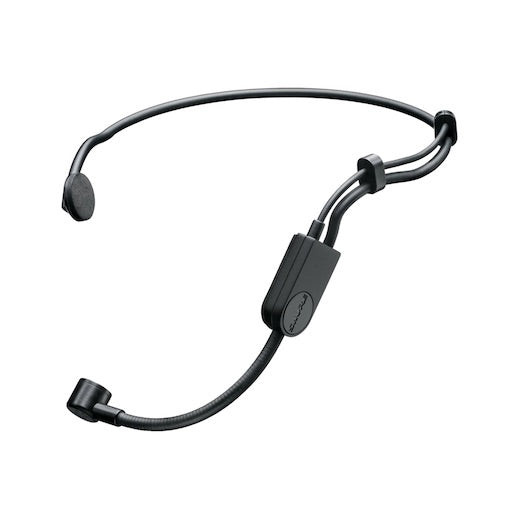
Shure SM35
The SM35 is known for its signature tight cardioid pattern, ensuring crisp vocal clarity even in high ambient-noise environments. Designed for multi-tasking performers who move and sing, it delivers hands-free, smooth audio performance.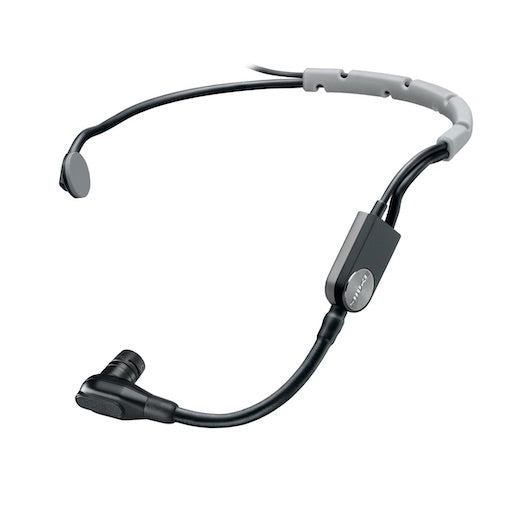
Shure SM31FH
Catering to the fitness domain, the SM31FH is a moisture-resistant cardioid condenser fitness headset microphone crafted to withstand the intensity of aerobic routines or gym sessions. Fitness professionals seeking durability combined with clear sound will find the SM31FH an unbeatable choice in sweat-resistant headset mics.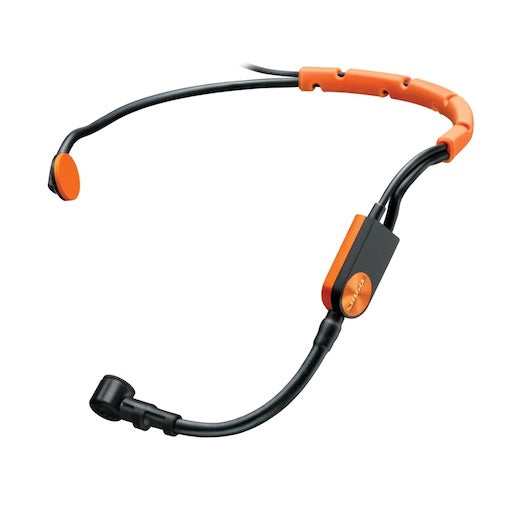
Shure MX153
The MX153, a sub-miniature earset microphone with an omnidirectional pickup pattern, is designed for discretion without compromising sound quality. Elevating spoken word applications, it’s the ideal companion for corporate presentations and houses of worship.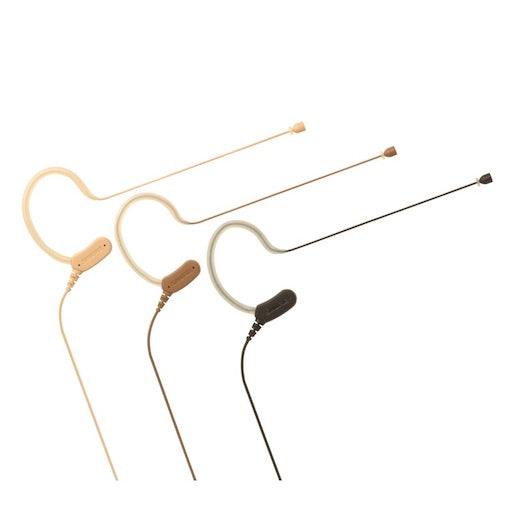
Shure DuraPlex DH5 Headset
Meeting the demands of rigorous environments, the Duraplex DH5 headset mic wireless showcases an IP57 rating for protection against dust and water. Its omnidirectional design ensures consistent sound capture, and its durable Plex cable makes it popular for those in broadcast, houses of worship, and theater. The DH5 headset is available in four colors and two connector types.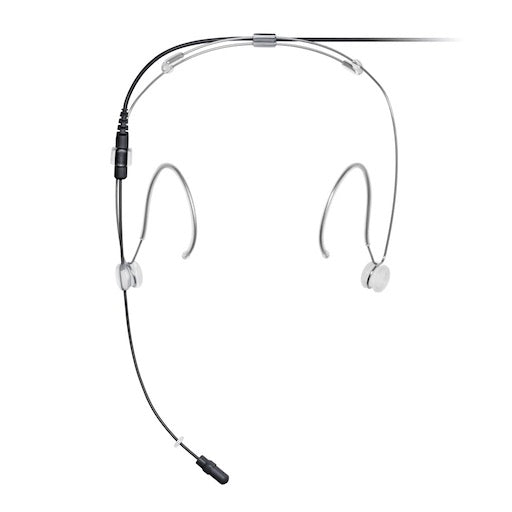
Shure TwinPlex TH53
Part of the Shure premium headset mic range, the TwinPlex TH53 promises unparalleled comfort with its lightweight design. Theater performers and broadcast presenters can bank on the durable Plex cable and its omnidirectional configuration for accurate line delivery, ensuring they remain in the limelight with every performance. The TH53 headset is available in three colors and four connector types.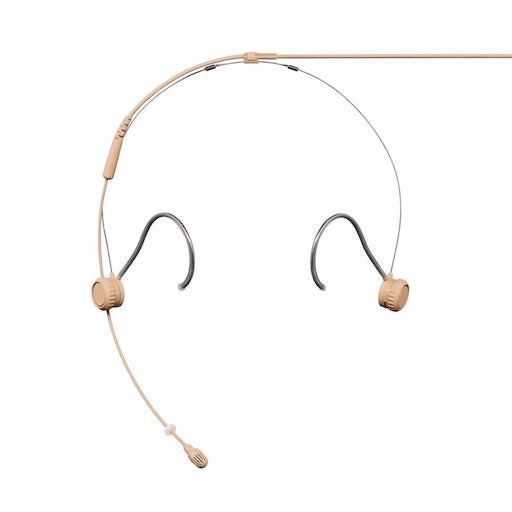
When choosing a Shure headset microphone, it’s all about matching the microphone’s capabilities to your specific needs. With Shure variety, you’re sure to find a microphone that resonates with your requirements, so your voice is always heard with utmost clarity.

